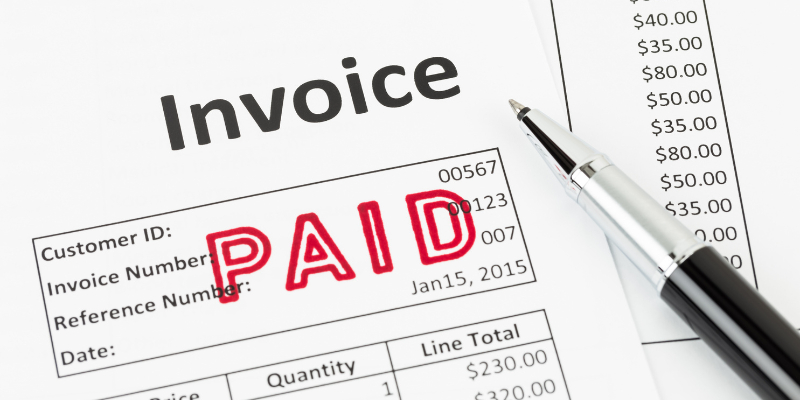If you’re a company that has slow-flowing cash invoices, cash flow might be tight now and again. Currently, you might have cash tied up in unpaid invoices that keep you from accomplishing your business goals. Some companies might wonder if there’s anything they can do to change that. One option for some companies is to use invoice factoring through a factoring company or bank, known as a factor, to free up some cash flow. What is invoice factoring? How does factoring work? Read on to learn about invoice factoring and if it could be a good fit for your business.
What Is Invoice Factoring?
Invoice factoring, or discount factoring, is a process wherein a third party buys your company’s unpaid invoices from you in exchange for a small fee. Basically, you have quite a few unpaid invoices, and you sell them to a factoring company at a discount, sacrificing a small percentage of your invoice value to gain quick and immediate access to needed capital and cash flow. The invoice amount then goes to the third-party company when it’s paid.
How Does Invoice Factoring Work? What Is the Process?
Those are the basics of factoring, but how does it really work? These are the essential steps of the invoice factoring process:
- Your company provides goods and services to your customers as usual and you create invoices for the customers to pay (typically within 30 or 60 days)
- You sell the invoices to a factor, turning over responsibility for collection
- The factor pays you a portion of the invoice amount upfront. Advance amounts typically range anywhere from 70–98% of the amount of the invoice, but it will often end up being around 80–90% of the invoice value
- Because the invoice is now owned by the factor, your customers pay the factor directly when their invoice is due, instead of paying you. The factor is responsible for collections and tracking of payment for outstanding debts
- After the factor receives payment from the customers, they pay you back the remainder of the invoice amount, minus their fee
At the end of the day, you get almost the entirety of the invoice amount (minus the fees, which usually equate to a small percentage of the total invoice amount). Invoice factoring gives you access to a large portion of the money before the customers pay, which can free up cash flow and capital for your company to use.
Invoice Factoring Example
Examples are a great way to make a complex process understandable. Here’s a hypothetical factoring example that shows how this process works. Let’s say a shoe manufacturer provides great and long-lasting products for a retailer to sell. The retailer is invoiced to pay for the shoes 30 days after purchase and delivery. The manufacturer would like to have cash flowing, so they’re able to restock and continue making merchandise without having their funds tied up in outstanding invoices.
The company chooses a factor to get some working capital from their unpaid invoices. They sell the factor 50 unpaid invoices for 85% of the value. The manufacturer uses that money to pay for additional stock and growth while the shoe retailer waits the 30 days and pays the invoiced amount directly to the factor. The manufacturer then receives a second payment from the factor with the remaining amount due from the invoice (15% minus the company’s fee).
Should My Company Use Invoice Factoring?
If the invoice factoring process sounds appealing to you, you are probably wondering if it’s right for your company. Unfortunately, there’s no one-size-fits-all solution when it comes to invoice factoring. The process works well for some companies and doesn’t for others. The best way to determine if your company should use factoring is to weigh the pros and cons of it and determine what matters most to your company. We’ll walk you through the advantages and disadvantages, so you can determine if your company is a good fit for invoice factoring.
Advantages & Disadvantages of Invoice Factoring
These are some of the major advantages and disadvantages of invoice factoring and using a factor with your business.
Advantages
- Provides a quick boost in cash flow, which can be key for businesses without a lot of working capital
- Factoring companies can provide useful information on your customers and their credit, which can help you choose the right customers
- Customers will often respect factoring companies and may pay sooner
- Cost-effective outsourcing is achievable due to the competition among many factoring companies eager for your business, keeping factor costs low
- Factoring companies can provide an excellent financial planning strategy
- Improved chances of your business surviving. Many businesses fail because of a lack of cash flow, so you can stay ahead of the competition with invoice factoring
Disadvantages
- If queries or disputes arise, you could have less available funding
- Invoice factoring does cost your company a small percentage of each factored invoice, which can shrink your profit margin
- Some customers may prefer to deal directly with your company instead of a factor
- Some customers may not like that your company is using a factor, which could affect your reputation
In general, companies that have many corporate customers and who need quicker access to cash flow can benefit from factoring. Companies with only one or a few corporate customers, or who worry it might affect their client relationships, might not find invoice factoring as beneficial.
Does My Business Qualify for Invoice Factoring?
Business financing of any kind typically requires qualification to make it happen, and the same thing applies to factoring. Luckily, qualifying for invoice factoring is generally easier than qualifying for any other type of business financing. These are the most common qualifications for factoring that can help you determine if it’s the right choice for you:
- Your customers must have good credit
- Your invoices must be free of any liens
- Your gross profit margins should be positive
- You must follow good invoicing practices
- Tax issues that arise must be manageable (having problems doesn’t disqualify you, but they must be resolvable with professional help)
- You can’t have any open bankruptcies
If your company meets these qualifications, invoice factoring can be an option to boost cash flow. You will still want to consider the advantages and disadvantages of the process to determine if it’s the right fit for your company.
Do I Have to Pay a Factoring Company?
The main question many people ask is if they have to pay a factor. The factor is providing your company with a service, so you will be paying a factor in a way. Typically, you pay a factor by allowing them to keep a certain percentage of the invoice amounts as their fee.
What is the factoring fee and how much will it cost you? Generally, the percentage is around 1–5% of the total invoice amount.
What percentage of each invoice will you receive as an initial advance? Again, it depends on your factoring agreement. Typically, you will get around 80% of the invoice amount in your initial payment. Then, you get the rest in a second payment after the customers have paid in full. How much you get in the second installment will depend on the credit of your customers, how quickly they pay the factor, and other determinants prioritized by your factor.
Here’s an example of how the payment process works. Let’s say you sell $20,000 worth of invoices to a factor. The factor takes a 2% factoring fee, which means they will keep $400, and you will get $19,600 back over the course of two payments. In your initial payment, you might get the first $16,000, so you can keep your cash flow smooth and maintain or grow your business operations. After your customers pay, you get the remaining $3,600 in your second payment from the factor, and they keep the last $400 as their fee. Ultimately, you do pay the factor, but you usually only spend a small amount on their services.
Choosing the Right Factoring Company
If you are considering a factor, you might want to know how to find the right fit. There are generally three questions you want to ask yourself before selecting a company:
- What kind of companies does this factoring company work with? You will want to find one that is familiar with your industry. For example, trucking companies can benefit from working with TAB Bank trucking invoice factoring because we specialize in that industry, among others.
- What does their invoice factoring process look like? You want to know how many invoices the factor will fund at one time, what happens if a customer fails to pay their invoice, how quickly you’ll receive funds, and other similar process elements, before selecting a factor. Most companies—like here at TAB Bank—provide details on their factoring process for clients to explore.
- What are their fees? You always want to know what using the service will ultimately cost your company. Some factoring companies may not be transparent about their costs or have hidden usage fees that may extend beyond the percent discount. Be sure to ask about these upfront when choosing a factor.
Do you have more questions about invoice factoring? There’s still plenty to learn! Learn more about factoring in our resource center to gain a better understanding of this unique service.


